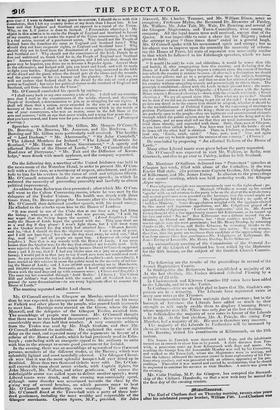Mr. O'Connell arrived in Glasgow on Monday, several hours later
than he was expected, in consequence of being detained on his route at Falkirk and other places by the people, who poured forth in crowds to meet him. Hustings were erected on the Green, where Sir John Maxwell, and the delegates of the Glasgow Trades, awaited him. The assemblage of people was immense. Mr. O'Connell thought that there must be two hundred thousand present : there was certainly considerably more than half that number. A very energetic address from the Trades was read by Mr. Hugh Graham, and then Mr. O'Connell addressed the multitude. He explained the cause of his delay on the road, and repeated many of the arguments in favour of a reform of the House of Lords, which he had previously used in Edin- burgh ; concluding with an energetic appeal to his auditory to unite with him in the attempt to secure good government for Ireland. In the evening, there was an assemblage of upwards of two thousand persons, members of the different trades, at the Bazaar; which was splendidly lighted and most tastefully adorned. The Glasgow Chroni- ck says that it was the most splendid banquet-hall ever fitted up in Scotland. More than two thousand tickets were sold. Mr. O'Con- nell entered the room about sevens o'clock, with Captain Spiers, Sir John Maxwell, Mr. Iliallace, and other gentlemen. Of course the indefatigable orator was called upon to deliver another speech ; many Liberal toasts were drunk, and the evening was convivially spent, although some disorder was occasioned towards the close by the giving way of several benches, on which persons eager to hear Mr. O'Connell more distinctly, were standing. The next day, Mr. O'Connell dined at the Town-hall with a party of three hun- dred gentlemen, including the most wealthy and respectable of the Glasgow merchants. Captain Spiers, M.P., presided. Sir John
VNIIM
alaswell, Mr. Clawless Tennant, and Mr. William Dixon, acted- ate croupiers ; Professor Mylne, the Reverend Dr. Brewster of Paisley, Mr. Wallace, Mr. John Tait, Mr. Weir, Dr. Bowring, and several of the Glasgow Magistrates, and Town-Councillors, were among the company. All the loyal toasts were well received, except that of the Queen. It was impossible to raise a cheer for her Majesty ; indeed the attempt to give " three times three" ended in a general laugh. Mr. O'Connell spoke with his accustomed spirit and energy; but as his object was to impress upon the assembly the necessity of reform- jug the House of Peers, his train of argument was necessarily similar to that which he followed in his Edinburgh speeches, which we have given so fully.
"It would (he said) be vain and ridiculous, it would he worse than idle and foolish, if, after congregating here this evening, and declaring that the House of Lords shall no longer impose a restraint upon the course of freedom into which the country is anxious to enter—if after such a declaration we should retire to our pillows and go to a perpetual sleep upon the subject, forgetting that we have exertions to make, and that no man has achieved advantages fur his country without struggling severely and perseveringly to obtain them. The principle is established—down with the Lords in their present form : the neces- sity is obvious—down with the Oligarchy—( Cheers).—down with the Apsley House coterie (Renewed eheering)—down with the swinish nitt:tittule. ( Great cheering.) We are all agreed upon this. Then what are we to do ? Should we be men if we did not do something to get rid of the evil ? I do not wish to go into any detail as to the course that should be allowed, whether it should be by the reestablishment of Political I7nions or by the convening of meetings to petition Parliament and address the King ; these are merles of proceeding that are perfectly open to the people—they are legitimate and constitutional channels through which the public opinion may be made known to the King and to the Legislature, and no man shall tell me that they are weak instruments. 1 have tried them already, and succeeded with them. Rally, then, men of Glasgow, as you have often rallied before. You have won but half the battle : do not lie down till the other half is obtained. There is, I believe, a favour ite High- land cry, Enish, enish, enish !" Now, now, now Now and again should be our cry to battle against the enemies of our country." ( (.heers.)
Ile concluded by proposing " An effectual Reform of the House of Lords."
Many other Liberal toasts were given before the party separated. Mr. O'Connell was expected to visit Mr. Wallace, at Kelly, near Greenock, and also to go over to l'uisley, before he left Scotland.


























 Previous page
Previous page